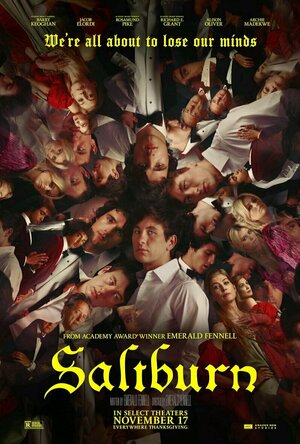Search

Les Misérables
TV Show Watch
Television adaptation of Victor Hugo's classic novel which follows Jean Valjean as he evades capture...
BBC PBS Masterpiece Les Mis Miniseries France
BankofMarquis (1832 KP) rated Saltburn (2023) in Movies
Dec 29, 2023
Interesting...Intriguing...and Dark
Actress/Writer/Director Emerald Fennell is turning into an artistic voice that bears noticing and with SALTBURN - her follow-up to PROMISING YOUNG WOMAN (the film that won her the Academy Award for Best Original Screenplay) - Fennell’s artistic voice is in full bloom.
Starring Barry Keoghan (Oscar nominated for THE BANSHEES OF INISHERIN), SALTBURN tells the story of an Oxford student who befriends the rich, cool kid (Jacob Elordi, EUPHORIA) who invites him back to his family compound, SALTBURN, for the summer with his eccentric (to say the least) family.
As written and directed by Fennell, SALTBURN is a satire on the elite rich, showing them in their extravagant, quirky isolation in their compound, looking down on the common folk from their piles of money (or…in some cases…oblivious of the common folk because of their money) while peeling back the layers to show the unhappiness and manipulation underneath.
Fennell layers this story richly, slowly folding back facades and layers to show the ugliness of inherently unhappy people who cover their unhappiness up with wealth, money and parties.
Into this world comes Oliver Quick (Keoghan) who is the audiences’ conduit into this level of living - and who has secrets of his own.
Keoghan is interesting to watch (as always) and the family…Elordi, Sadie Soverall (his sister) and Archie Madekwe (another outsider who is jealous of Oliver’s appearance) all are good looking, good enough performers who live the hedonistic lifestyle and deny the consequences and responsibilities thereof.
When a film needs an “ice queen” as the matriarch of a family, Rosamund Pike is, inevitably, brought in and she brings the goods to Saltburn. She is perfectly cast as the mother of the family who says what she thinks, does not show what she is feeling and doesn’t give a darn about anyone else. She is suitably balanced by the off-balanced, quirky performance of the always good Richard E. Grant as the patriarch of the family who is (usually) lost in his own little world of whatever fantasy he is currently involved in.
But if this was just a film about a quirky family, it would be a fun, interesting romp. But…in Fennell’s hands, it becomes something much more sinister - and much more interesting - to watch.
Saltburn is a film that one must sit with after watching to digest what was just witnessed, but…ultimately…is one that is very interesting….and intriguing…and dark.
Letter Grade: B+
7 1/2 stars (out of 10) and you can take that to the Bank(ofMarquis)
Starring Barry Keoghan (Oscar nominated for THE BANSHEES OF INISHERIN), SALTBURN tells the story of an Oxford student who befriends the rich, cool kid (Jacob Elordi, EUPHORIA) who invites him back to his family compound, SALTBURN, for the summer with his eccentric (to say the least) family.
As written and directed by Fennell, SALTBURN is a satire on the elite rich, showing them in their extravagant, quirky isolation in their compound, looking down on the common folk from their piles of money (or…in some cases…oblivious of the common folk because of their money) while peeling back the layers to show the unhappiness and manipulation underneath.
Fennell layers this story richly, slowly folding back facades and layers to show the ugliness of inherently unhappy people who cover their unhappiness up with wealth, money and parties.
Into this world comes Oliver Quick (Keoghan) who is the audiences’ conduit into this level of living - and who has secrets of his own.
Keoghan is interesting to watch (as always) and the family…Elordi, Sadie Soverall (his sister) and Archie Madekwe (another outsider who is jealous of Oliver’s appearance) all are good looking, good enough performers who live the hedonistic lifestyle and deny the consequences and responsibilities thereof.
When a film needs an “ice queen” as the matriarch of a family, Rosamund Pike is, inevitably, brought in and she brings the goods to Saltburn. She is perfectly cast as the mother of the family who says what she thinks, does not show what she is feeling and doesn’t give a darn about anyone else. She is suitably balanced by the off-balanced, quirky performance of the always good Richard E. Grant as the patriarch of the family who is (usually) lost in his own little world of whatever fantasy he is currently involved in.
But if this was just a film about a quirky family, it would be a fun, interesting romp. But…in Fennell’s hands, it becomes something much more sinister - and much more interesting - to watch.
Saltburn is a film that one must sit with after watching to digest what was just witnessed, but…ultimately…is one that is very interesting….and intriguing…and dark.
Letter Grade: B+
7 1/2 stars (out of 10) and you can take that to the Bank(ofMarquis)
Chris Sawin (602 KP) rated Midsommar (2019) in Movies
Jun 26, 2019 (Updated Jul 4, 2019)
When a director like Ari Aster only has two full-length features under his belt, it’s difficult not to compare his works but the truth of the matter is that Hereditary and Midsommar are two incredibly different films. Hereditary seemed to thrive on lurking in the shadows visually to assist in its dark storytelling. Nearly all of Midsommar takes place under blinding sunlight making the horrific events that unfold feel stranger and even more out of place, confusing, and bizarrely unsettling. Based on his two films though, Aster does seem to flock towards a few common themes. Grief, loss, and the inability to cope have plagued the main characters of his films while the importance of family takes a high precedence. Hereditary was more about a specific family attempting to stay together while already being in shambles and Midsommar attempts to create a new family on more than one occasion with the possibility of constant expansion.
Dani’s (Florence Pugh) life is turned inside out once a devastating tragedy leaves her dumbstruck. She leans on her boyfriend of four years, Christian (Jack Reynor), for support, but their relationship is obviously strained. Along with their friends Josh (William Jackson Harper) and Mark (Will Poulter), Dani and Christian end up going on vacation to rural Sweden. They travel to a small village where their friend Pelle (Vilhelm Blomgren) grew up and now serves as their host. A rare nine-day festival that only occurs once every 90 years is being celebrated. Josh is utilizing the trip as a means to bulk up his folklore thesis for college while Mark is more interested in partaking in the Swedish women. Christian is attempting to figure out what his thesis will be while Dani searches for some sort of guidance after such a tragic occurrence. Their trip becomes increasingly more peculiar the longer they stay as they’re forced to witness violent rituals and are encouraged to embrace the ways of a Pagan cult.
The intricate illustrations throughout the film like in the opening shot, the elongated love potion cloth, or the walls of the barn-like structure Dani and her friends sleep in, give Midsommar this dark fairy tale aspect to it that a film like Pan’s Labyrinth would be proud of. The Pagan roots of Pelle’s village and the film’s metaphorical feet being so firmly planted in such rich folklore give Midsommar this cautiously fanciful aesthetic. The film capitalizes on the nostalgic sensation of when fairy tales and children’s books were read to you as a child. There are consistent signs that things aren’t right, paranoia lurks around every corner, and the locals set off every ominous alarm in your body, but there’s that naïve part of us buried deep down that wishes for and hopes for a happy ending because cosmetically we believe that is what resides at the end of every fairy tale not written by Jakob and Wilhelm Grimm (The Brothers Grimm).
It’s also interesting observing the main and supporting characters of the film or basically all of the “outsider” guests of the festival. Pelle acts as a conduit/guide between his village and the outside world, Josh is a historian/researcher, Mark is a mocker/fool, Dani and Christian are a strained couple, and Connie (Ellora Torchia) and Simon (Archie Madekwe) are a flourishing one. According to Wikipedia, Ari Aster based Dani and Christian’s relationship on a bad breakup. Midsommar is also way funnier than it has any right to be; something Hereditary completely distanced itself from. Midsommar goes out of its way to boast about who Dani’s real family is in the film. The unified chanting, outrageous theatrics, and harmonized moaning may seem like mockery or complete insanity to some. While it is humorous at times, it seems like this is the way the locals can experience everything everyone else does as a cohesive unit. This seems relevant to emotions, hallucinogens, and even sustenance; this cult does everything together.
Midsommar isn’t going to sit right with a lot of people, especially since Ari Aster desired to be confusing when it came to making the film. With all of the drug-taking in the film being so common, Midsommar may leave you feeling as groggy and disoriented as the characters on screen. However, in between the sacrifices, the brutality, the graphic nature of the film, inbred oracles, and plethora of naked mature women moaning in unison there’s something unique and brilliant about Midsommar you can’t find elsewhere. It may draw parallels to films like Robin Hardy’s The Wicker Man and may feel like a bleaker version of The Wizard of Oz on a bad acid trip, but Midsommar is unlike any other film you’ll see this year. In a way, Dani and her friends all get exactly what they came for but the end outcome is that the majority of them bit off more than they could chew. Truth be told, you’ll never look at a bear in a film the same way again even if it does remind you of the Tanooki suit Mario wore in Super Mario Bros 3. This is the type of film where you could literally tell someone everything that happens and it wouldn’t really spoil the film for them. The context of these events is important to witness in succession and in their entirety since what each individual takes away from the film will likely differ person to person.
There’s a deliberate pacing of the film many will find too slow and uneventful as the film’s two and a half hour runtime will already feel daunting. Aster has teased that the original cut of the film was three hours and 45 minutes and he has a version of the film that is 25 minutes longer that was difficult to cut down to the theatrical cut currently in theaters. An extended cut of the film or a large amount of deleted scenes on the Blu-ray (how about that levitation sequence from the trailer?) would certainly be intriguing.
If you enjoy ambiguous filmmaking where everything isn’t explained and the film’s imagery can mean more than one specific thing, then Midsommar may be worth checking out. It is an outlandish experiment by Ari Aster that a large quantity will likely deem a failure. Personally speaking though, Midsommar is such an unconventionally different ceremonial fever dream loaded with preposterousness, beautiful cinematography, hilarity, and anxiety-fueled-dread that it’s not only memorable and bold but also the type of one-of-a-kind film experience I crave whenever the lights dim and the quiet hum of a projector accelerates into a dull yet soothing roar.
Dani’s (Florence Pugh) life is turned inside out once a devastating tragedy leaves her dumbstruck. She leans on her boyfriend of four years, Christian (Jack Reynor), for support, but their relationship is obviously strained. Along with their friends Josh (William Jackson Harper) and Mark (Will Poulter), Dani and Christian end up going on vacation to rural Sweden. They travel to a small village where their friend Pelle (Vilhelm Blomgren) grew up and now serves as their host. A rare nine-day festival that only occurs once every 90 years is being celebrated. Josh is utilizing the trip as a means to bulk up his folklore thesis for college while Mark is more interested in partaking in the Swedish women. Christian is attempting to figure out what his thesis will be while Dani searches for some sort of guidance after such a tragic occurrence. Their trip becomes increasingly more peculiar the longer they stay as they’re forced to witness violent rituals and are encouraged to embrace the ways of a Pagan cult.
The intricate illustrations throughout the film like in the opening shot, the elongated love potion cloth, or the walls of the barn-like structure Dani and her friends sleep in, give Midsommar this dark fairy tale aspect to it that a film like Pan’s Labyrinth would be proud of. The Pagan roots of Pelle’s village and the film’s metaphorical feet being so firmly planted in such rich folklore give Midsommar this cautiously fanciful aesthetic. The film capitalizes on the nostalgic sensation of when fairy tales and children’s books were read to you as a child. There are consistent signs that things aren’t right, paranoia lurks around every corner, and the locals set off every ominous alarm in your body, but there’s that naïve part of us buried deep down that wishes for and hopes for a happy ending because cosmetically we believe that is what resides at the end of every fairy tale not written by Jakob and Wilhelm Grimm (The Brothers Grimm).
It’s also interesting observing the main and supporting characters of the film or basically all of the “outsider” guests of the festival. Pelle acts as a conduit/guide between his village and the outside world, Josh is a historian/researcher, Mark is a mocker/fool, Dani and Christian are a strained couple, and Connie (Ellora Torchia) and Simon (Archie Madekwe) are a flourishing one. According to Wikipedia, Ari Aster based Dani and Christian’s relationship on a bad breakup. Midsommar is also way funnier than it has any right to be; something Hereditary completely distanced itself from. Midsommar goes out of its way to boast about who Dani’s real family is in the film. The unified chanting, outrageous theatrics, and harmonized moaning may seem like mockery or complete insanity to some. While it is humorous at times, it seems like this is the way the locals can experience everything everyone else does as a cohesive unit. This seems relevant to emotions, hallucinogens, and even sustenance; this cult does everything together.
Midsommar isn’t going to sit right with a lot of people, especially since Ari Aster desired to be confusing when it came to making the film. With all of the drug-taking in the film being so common, Midsommar may leave you feeling as groggy and disoriented as the characters on screen. However, in between the sacrifices, the brutality, the graphic nature of the film, inbred oracles, and plethora of naked mature women moaning in unison there’s something unique and brilliant about Midsommar you can’t find elsewhere. It may draw parallels to films like Robin Hardy’s The Wicker Man and may feel like a bleaker version of The Wizard of Oz on a bad acid trip, but Midsommar is unlike any other film you’ll see this year. In a way, Dani and her friends all get exactly what they came for but the end outcome is that the majority of them bit off more than they could chew. Truth be told, you’ll never look at a bear in a film the same way again even if it does remind you of the Tanooki suit Mario wore in Super Mario Bros 3. This is the type of film where you could literally tell someone everything that happens and it wouldn’t really spoil the film for them. The context of these events is important to witness in succession and in their entirety since what each individual takes away from the film will likely differ person to person.
There’s a deliberate pacing of the film many will find too slow and uneventful as the film’s two and a half hour runtime will already feel daunting. Aster has teased that the original cut of the film was three hours and 45 minutes and he has a version of the film that is 25 minutes longer that was difficult to cut down to the theatrical cut currently in theaters. An extended cut of the film or a large amount of deleted scenes on the Blu-ray (how about that levitation sequence from the trailer?) would certainly be intriguing.
If you enjoy ambiguous filmmaking where everything isn’t explained and the film’s imagery can mean more than one specific thing, then Midsommar may be worth checking out. It is an outlandish experiment by Ari Aster that a large quantity will likely deem a failure. Personally speaking though, Midsommar is such an unconventionally different ceremonial fever dream loaded with preposterousness, beautiful cinematography, hilarity, and anxiety-fueled-dread that it’s not only memorable and bold but also the type of one-of-a-kind film experience I crave whenever the lights dim and the quiet hum of a projector accelerates into a dull yet soothing roar.

